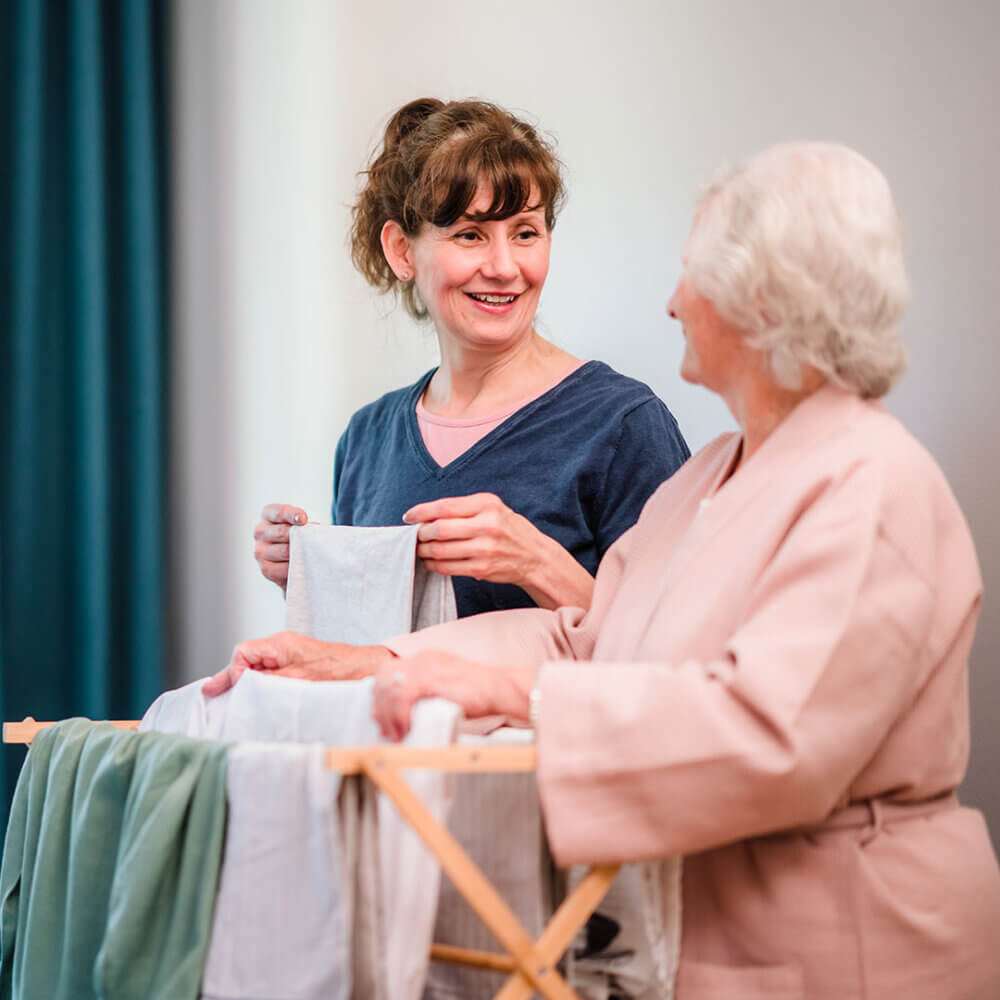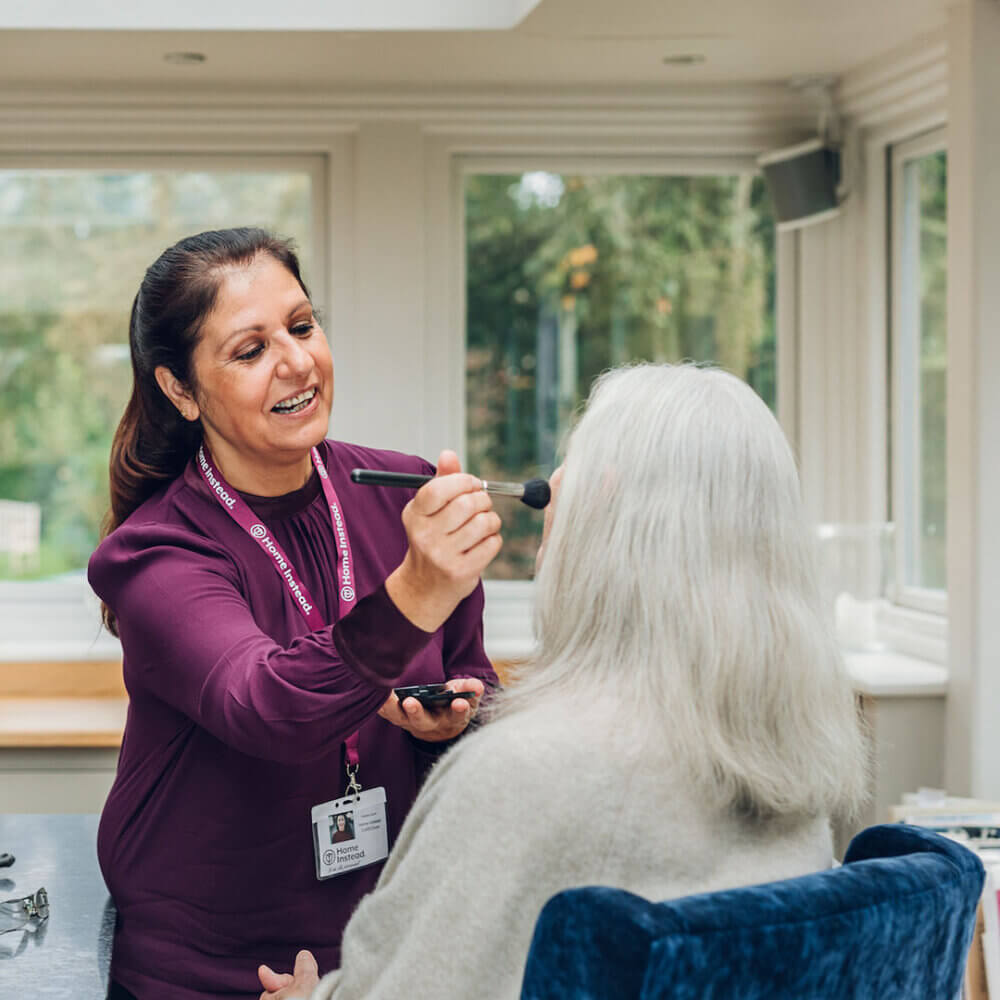Ideas for Topics and Questions that Encourage Deep Conversations
At Home Instead Reading, our mission is to enhance the lives of ageing adults and their families through personalised, high-quality home care.

At Home Instead Reading, our mission is to enhance the lives of ageing adults and their families through personalised, high-quality home care. We understand the pivotal role that starting meaningful conversations plays in strengthening relationships, fostering understanding, and enhancing the overall caregiving experience. Whether it’s a caregiver connecting with a client or family members bonding with their loved ones, the depth of our conversations can significantly impact emotional and mental well-being.
Meaningful conversations are about creating deeper connections, understanding each other’s experiences, and building trust. In caregiving contexts, these conversations can be especially powerful, providing comfort, companionship, and a sense of belonging. This blog post explores the benefits of deep conversations, suggests topics and questions to encourage these dialogues, and shares practical tips for making every conversation count in both professional and personal settings.

The Benefits of Meaningful Conversations
Meaningful conversations offer numerous benefits, particularly for those receiving care. They can significantly improve mental and emotional well-being by reducing feelings of loneliness and isolation. Engaging in deep conversations provides a sense of validation and appreciation, making individuals feel heard and understood.
In professional and personal settings, meaningful conversations are instrumental in building trust and understanding between caregivers and clients. They allow caregivers to gain insights into the client’s preferences, needs, and life history, which can inform more personalised and compassionate care. This understanding helps to create a more comfortable and familiar environment, essential for the well-being of those in care.

Topics to Encourage Deep Conversations
Personal History and Memories
Delving into personal history and cherished memories can evoke a wealth of emotions and stories. These topics help individuals reflect on their lives, celebrate their achievements, and share their unique journeys. This kind of engagement can turn small talk into a good conversation that creates lasting bonds.
Questions to Ask:
- Can you tell me about your childhood home and neighbourhood?
- What were some of your family traditions growing up?
- Can you share a story about a significant life event that shaped who you are today?
Hobbies and Interests
Discussing hobbies and interests can reveal passions and talents, providing an opportunity for individuals to talk about what they love. These conversations can be particularly engaging and can reignite a sense of enthusiasm and joy. They can also help in finding common ground, making the interaction more enjoyable for both parties.
Suggestions for Discussion:
- What are some of your favourite books or authors?
- Can you tell me about a hobby you enjoyed and why it was special to you?
- What kind of movies or music do you enjoy, and what makes them your favourites?
Life Lessons and Values
Exploring life lessons and values can offer profound insights into an individual’s beliefs and philosophies. These discussions can be deeply enriching and provide a platform for sharing wisdom and experiences. It’s a way to engage in conversation that goes beyond the superficial, touching on what truly matters to the person.
Ideas for Questions:
- What are some of the most important lessons you’ve learned in life?
- Can you share a time when your values guided you through a difficult situation?
- What personal philosophies have you found to be most meaningful?
Future Aspirations
Even in later stages of life, having dreams and goals is important. Discussing future aspirations can inspire hope and provide a sense of purpose and direction. These conversations can also reveal new interests or hobbies that can be pursued, adding a sense of fun and excitement to life.
Encouraging Discussions About:
- What are some goals or aspirations you still have for the future?
- Is there something new you’ve always wanted to try or learn about?
- How do you envision your ideal future, and what steps would you like to take to get there?

Practical Tips for Starting Conversations
Initiating meaningful conversations requires sensitivity, patience, and genuine interest. Here are some strategies to help you start and sustain these important dialogues, whether you are in a professional setting or spending time with loved ones in your own home.
Finding the Right Time and Setting
Choose a comfortable and quiet setting where distractions are minimal. Ensure that the timing is suitable, allowing for a relaxed and unhurried conversation. This is crucial whether you are engaging in a professional interview, participating in a companionship service, or having a heartfelt talk with friends and family.
Being an Active Listener
Show that you are listening by maintaining eye contact, nodding, and providing verbal affirmations. Active listening involves not just hearing the words but understanding the emotions and intentions behind them. This skill is vital in building confidence and ensuring that the person feels valued and understood.
Showing Genuine Interest
Express genuine curiosity and interest in the other person’s experiences and thoughts. Ask follow-up questions that delve deeper into their responses, showing that you value what they have to say. This approach helps in creating a good conversationalist out of anyone by focusing on the quality of the interaction rather than just the content.
Using Open-Ended Questions
Open-ended questions encourage detailed responses and keep the conversation flowing. Instead of yes/no questions, ask questions that require more elaborate answers, such as “Can you describe…” or “What do you think about…”. This technique is especially useful in both professional settings like job interviews and personal settings like family gatherings.

Home Instead Reading’s Approach to Caregiving
At Home Instead Reading, we prioritise the emotional and social well-being of our clients alongside their physical care needs. Our caregivers are trained to foster meaningful interactions and build strong, trusting relationships with clients. We believe that understanding our clients’ histories, interests, and values is crucial to providing personalised and compassionate care.

Our Services
Home Instead Reading offers a range of services tailored to meet the unique needs of each client. These include personal care, companionship care, home help, and specialised care for conditions such as dementia and Alzheimer’s disease. Our caregivers take the time to engage in conversations, listen to stories, and participate in activities that our clients enjoy, ensuring a holistic approach to care.

Testimonials and Success Stories
Our caregivers have successfully built deep connections with clients, often becoming like family members. Here are a few testimonials from our satisfied clients:
Mrs. Johnson: “My caregiver from Home Instead is not just a helper; she’s a friend. We talk about everything from my childhood memories to my favourite books. She makes me feel valued and understood.”
Mr. Smith: “Having meaningful conversations with my caregiver has made a huge difference in my life. I feel less lonely and more connected, and I look forward to our chats every day.”

Exploring Additional Support: NHS Talking Therapies Berkshire
While Home Instead Reading focuses on providing personalised home care enriched with meaningful conversations, we recognise that some individuals may require additional mental health support. For such needs, NHS Talking Therapies Berkshire offers an excellent resource through their SilverCloud online therapy platform. This service is perfect for those who prefer the flexibility of accessing therapeutic support online without appointments or direct interaction with a therapist.
SilverCloud provides various courses aimed at addressing common mental health issues such as low mood, anxiety, and stress. These courses include interactive tools like video clips, quizzes, and case studies to help manage mental health effectively. With the support of trained therapists who monitor progress and offer advice online, users can receive guided support at their own pace. For more information or to get started, contact NHS Talking Therapies Berkshire at 0300 365 2000 or email [email protected].

Conclusion
Meaningful conversations are essential for effective caregiving, offering numerous benefits for both clients and caregivers by fostering emotional well-being, building trust, and creating connections. At Home Instead Reading, we prioritise facilitating these important dialogues to ensure our clients feel heard, valued, and understood.
If you want to learn more about how Home Instead Reading can provide personalised home care services, please schedule a consultation with us.
In summary, focusing on personal history, interests, values, and future aspirations through effective conversation skills like active listening and open-ended questions can lead to deeper relationships and better care. These conversations enrich the lives of those in our care, as well as caregivers, family members, and friends, by finding common ground and making every moment more rewarding. Discussing hobbies, future goals, and cherished memories can transform social interactions and create lasting bonds.

Areas We Serve
Caversham, Emmer Green, Woodley, Earley, Tilehurst, Pangbourne, Sonning, Henley-on-Thames, Twyford, Wokingham
RG1 1, RG1 2, RG1 3, RG1 4, RG1 5, RG1 6, RG1 7, RG1 8, RG2 0, RG2 6, RG2 7, RG2 8, RG2 9, RG30 1, RG30 2, RG30 3, RG30 4, RG30 6, RG31 4, RG31 5, RG31 6, RG31 7, RG4 5, RG4 7, RG4 8, RG5 3, RG6 1, RG6 3, RG6 4, RG6 5, RG6 6, RG6 7, RG8 7, RG8 8, RG8 9
1st Floor, elizabeth house, 20-24 School Rd, Tilehurst, Reading RG31 5AL, UK